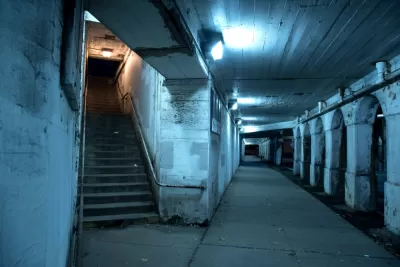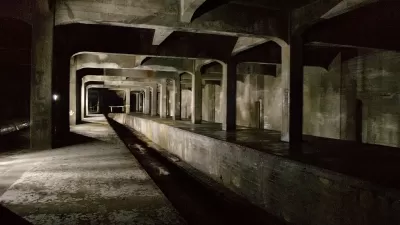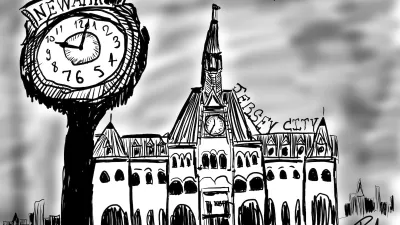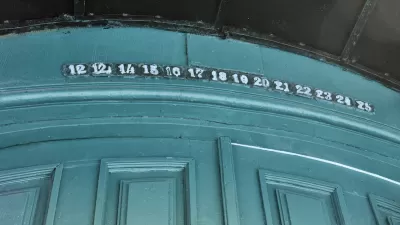According to one author, urban ghost stories are one way humans fight the alienation of modern life.

“Most metropolises are overrun with ghosts,” asserts Azania Imtiaz Khatri-Patel in a piece on Aeon. But Khatri-Patel isn’t just referring to the unfortunate souls that populate urban legends. Rather, “Our lives in cities are shaped by invisible hands, body-less voices and an eerie automation of infrastructure.”
For Khatri-Patel, “The automation of cities has the effect of alienating people from a state of personhood. It’s as if there is a tacit shadow-self that urban life produces.” Khatri-Patel recounts the anecdote of the woman whose deceased husband recorded some of London’s famous “mind the gap" announcements. After the transit agency switched the announcements to automated voices in 2012, Margaret McCollum’s story made national news, striking a chord with the public and prompting Transport for London to restore the original recordings at the station nearest to McCollum.
The article gives a wide range of examples of how the tension between tradition and modernity, between established customs and industrialization, between humans and automation, creates a need for urban ghost stories and legends about the abandoned spaces and mysterious nooks of modern cities. As Khatri-Patel points out, “Utilitarian approaches to urban planning do not leave room for emptiness. Spaces that fall into disuse for one purpose are quickly repurposed for another.” When spaces do stay vacant, they take on an eerie atmosphere, lending themselves to shadowy entities both literal and metaphorical.
“Yet there is a potent reconciliatory power to memory and ghosts. As we mark ghosts, we return their personhood,” Khatri-Patel concludes. Acknowledging urban ghosts means understanding the layers of history and meaning that accumulate as cities and society continuously evolve.
FULL STORY: Ghosts haunt cities, seeking revenge for the disappeared past

Planetizen Federal Action Tracker
A weekly monitor of how Trump’s orders and actions are impacting planners and planning in America.

Maui's Vacation Rental Debate Turns Ugly
Verbal attacks, misinformation campaigns and fistfights plague a high-stakes debate to convert thousands of vacation rentals into long-term housing.

Restaurant Patios Were a Pandemic Win — Why Were They so Hard to Keep?
Social distancing requirements and changes in travel patterns prompted cities to pilot new uses for street and sidewalk space. Then it got complicated.

In California Battle of Housing vs. Environment, Housing Just Won
A new state law significantly limits the power of CEQA, an environmental review law that served as a powerful tool for blocking new development.

Boulder Eliminates Parking Minimums Citywide
Officials estimate the cost of building a single underground parking space at up to $100,000.

Orange County, Florida Adopts Largest US “Sprawl Repair” Code
The ‘Orange Code’ seeks to rectify decades of sprawl-inducing, car-oriented development.
Urban Design for Planners 1: Software Tools
This six-course series explores essential urban design concepts using open source software and equips planners with the tools they need to participate fully in the urban design process.
Planning for Universal Design
Learn the tools for implementing Universal Design in planning regulations.
Heyer Gruel & Associates PA
JM Goldson LLC
Custer County Colorado
City of Camden Redevelopment Agency
City of Astoria
Transportation Research & Education Center (TREC) at Portland State University
Jefferson Parish Government
Camden Redevelopment Agency
City of Claremont





























